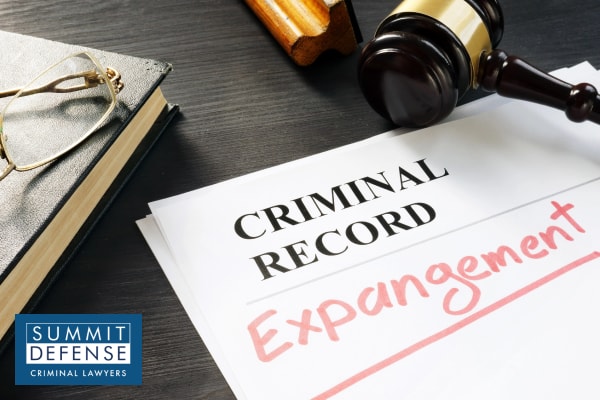Can a Misdemeanor Be Expunged or Sealed?
 Yes, in many cases, a misdemeanor conviction can be expunged or sealed, but there are specific conditions you must meet. If you’re interested in removing a misdemeanor from your criminal record, it’s important to understand the process.
Yes, in many cases, a misdemeanor conviction can be expunged or sealed, but there are specific conditions you must meet. If you’re interested in removing a misdemeanor from your criminal record, it’s important to understand the process.
What Is Expungement?
Expungement is the legal process of removing a criminal conviction from your record. When a misdemeanor is expunged, it no longer shows up on background checks conducted by potential employers or landlords. An expungement can give you a fresh start and help you move forward without the burden of a past conviction.
However, not all misdemeanors can be expunged. You must typically complete your sentence, including probation and fines, and meet other eligibility criteria. Once granted, the misdemeanor is dismissed, but the conviction is not erased. It’s important to work with experienced expungement attorneys to ensure the best chance of success.
Eligibility for Expungement
To be eligible for expungement, you must meet certain requirements. These include completing your sentence, including any probation or community service, and having no other pending criminal charges. You cannot be on probation or facing jail time at the time of filing for expungement. Minor misdemeanors often have a higher chance of being expunged than more serious offenses.
If you meet the eligibility criteria, expungement may be possible. A skilled attorney can help you navigate the process and ensure you meet all the requirements. Eligibility for expungement varies depending on the nature of the misdemeanor offense and the specific laws of the state where the conviction occurred.
Record Sealing vs. Expungement
Record sealing and expungement are two different processes. Sealing a record prevents the public from seeing your criminal history, but it does not remove the conviction. It can still be accessed by law enforcement or certain entities, like licensing boards. In contrast, expungement removes the conviction from your record entirely.
Sealing is typically easier to obtain than expungement. In some cases, sealing may be the only option if expungement is not available. The main benefit of sealing is that it keeps a criminal conviction private, which can be helpful during the job application or housing process. It’s important to understand which option is best for you based on the nature of your misdemeanor offense and your long-term goals.
How a Misdemeanor Affects Your Future
A misdemeanor conviction can affect many areas of your life, from job opportunities to housing. Here’s how a misdemeanor may impact your future in terms of employment, housing, and your rights:
Employment & Background Checks
A misdemeanor conviction can make it harder to obtain employment. Many employers conduct criminal background checks, and a misdemeanor charge may show up. Even a minor offense can hurt your chances of getting hired, especially in industries that require background checks for positions involving trust or security.
For certain positions, like those in healthcare, education, or finance, a criminal conviction can be a significant barrier. However, some employers may overlook a misdemeanor, especially if it occurred a long time ago and you’ve shown rehabilitation.
Seeking legal advice about your rights and options can help you handle any employment barriers you face due to a past misdemeanor.
Housing and Rental Applications
Misdemeanors can also affect your ability to secure housing. Landlords and property managers often conduct background checks before renting to potential tenants. A misdemeanor conviction may be viewed as a risk, making it harder to secure an apartment or rental property.
Some landlords may reject rental applications based on criminal history, even for minor offenses. However, some states and cities have laws that protect individuals from discrimination based on past criminal convictions. If you’re struggling to find housing due to a misdemeanor, legal counsel may help you understand your rights and find ways to overcome these obstacles.
Gun Rights & Professional Licenses
Certain misdemeanors can affect your gun rights and professional licenses. In some states, a misdemeanor conviction can result in the loss of your right to own a firearm. Depending on the crime, it may also impact your eligibility to hold a professional license, such as those for healthcare, teaching, or law.
If you’re a first-time offender or have been convicted of a minor misdemeanor, expunging or sealing your record could restore your gun rights or professional licenses. It’s important to check the eligibility criteria and understand how a misdemeanor conviction may impact your rights in these areas.
 A misdemeanor conviction can stay on your criminal record for life. This can affect your job prospects, housing options, and even your ability to get certain licenses. A misdemeanor charge might seem minor, but it can have long-lasting consequences.
A misdemeanor conviction can stay on your criminal record for life. This can affect your job prospects, housing options, and even your ability to get certain licenses. A misdemeanor charge might seem minor, but it can have long-lasting consequences.

 Yes, in many cases, a misdemeanor conviction can be expunged or sealed, but there are specific conditions you must meet. If you’re interested in removing a misdemeanor from your criminal record, it’s important to understand the process.
Yes, in many cases, a misdemeanor conviction can be expunged or sealed, but there are specific conditions you must meet. If you’re interested in removing a misdemeanor from your criminal record, it’s important to understand the process. If you want to remove a misdemeanor from your criminal record, there are steps you can take. First, it’s important to understand the process and the eligibility criteria.
If you want to remove a misdemeanor from your criminal record, there are steps you can take. First, it’s important to understand the process and the eligibility criteria. If you have a misdemeanor on your record and are looking to remove it,
If you have a misdemeanor on your record and are looking to remove it,